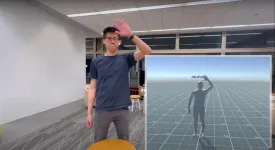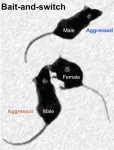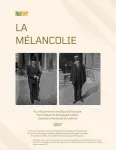(Press-News.org) WASHINGTON (Oct. 15, 2024)—Six medical technology innovators focused on pediatric cardiology were selected to receive grants of $50,000 each in the “Make Your Medical Device Pitch for Kids!TM” competition in Toronto. The funds will help awardees bring their devices to the market and improve care for children with heart conditions.
The awardees, selected from a highly competitive field of ten finalists, are:
Bloom Standard, Minneapolis—Autonomous, hands-free ultrasound
Compremium AG, Bern, Switzerland—Noninvasive central venous pressure estimation for pediatric patients
Massachusetts Institute of Technology, Cambridge, Mass.—Polymeric auxetic stent to treat pediatric aortic coarctation
OxiWear, Arlington, Va.—Home measurement of oxygen levels in pediatric congenital heart disease
PyrAmes Inc., Cupertino, Calif.—Improved, wearable, noninvasive pediatric blood pressure monitor
Sibel Health, Chicago—Hospital-to-home monitoring for pediatric heart conditions
The competition is presented by the Alliance for Pediatric Device Innovation (APDI), a nonprofit consortium led by Children’s National Hospital and funded through the Food and Drug Administration (FDA), and Additional Ventures, a nonprofit focused on accelerating research progress and improving clinical care for individuals born with single ventricle heart defects. Along with grant funding, awardees gain access to support services and technical expertise provided by APDI and Additional Ventures in areas that include engineering, regulatory, reimbursement, clinical trials study design and data science services.
According to the Centers for Disease Control and Prevention, about 40,000 children are born annually with a congenital heart defect. Children with heart conditions need medical devices tailored to their specific physiological needs. There is a significant unmet need for pediatric devices designed to monitor and treat young patients effectively in cardiology, interventional cardiology, cardiac surgery and electrophysiology. This competitive grant program is designed to identify and support the development and commercialization of devices addressing these needs.
"Congratulations to our awardees, whose innovative technologies show great promise in advancing care for pediatric heart patients," said Kolaleh Eskandanian, Ph.D., M.B.A., vice president and chief innovation officer at Children's National and APDI program director and principal investigator. "We are thrilled to welcome this new cohort into our pediatric device accelerator, where they will have the opportunity to collaborate with clinician-scientists at Children's National and connect to Additional Ventures’ network. Along with these collaborations, the awardees will benefit from a full range of APDI wraparound services designed to support the development of devices specifically for pediatric patients, helping them navigate the complex path to market."
The competition was held in conjunction with the 12th Annual Symposium on Pediatric Device Innovation, presented by Children’s National and co-located with The MedTech Conference powered by AdvaMed. Focused on transforming pediatric care with exclusive innovations for children, this year’s symposium featured panel discussions and keynote presentations with leading experts in pediatrics and medical technology to exchange information and ideas on critical issues in pediatric device development and pediatric healthcare innovation gaps.
“Additional Ventures is thrilled to support this new class of innovators whose products will make a profound impact in the management and care of pediatric heart patients,” said Additional Ventures CEO Kristie Keller, Ph.D. “We welcome them to our growing community of inventors, researchers and clinicians, and we look forward to working together with our awarded teams and ADPI to bring these products to market. We hope that this competition both inspires and activates the community and brings much-needed new entrants and new ideas to pediatric-first device development.”
APDI is one of five nonprofit consortia in the FDA’s Pediatric Device Consortia grant program. It receives funding to provide a platform of services, expertise and grants that support pediatric innovators in bringing medical devices to the market that specifically address the unmet needs of children. Led by Children’s National, APDI partners include Johns Hopkins University, CIMIT at Mass General Brigham, Tufts Medical Center, MedStar Health Research Institute, MedTech Color and OrthoPediatrics Corp.
Media contacts: Jhanae Kelley | jhanae@carbonaragroup.com | 713.524.8170 x111
Cherri Carbonara | cherri@carbonaragroup.com | 713.524.8170 x114
###
About Children’s National Hospital
Children’s National Hospital, based in Washington, D.C., was established in 1870 to help every child grow up stronger. Today, it is one of the top 10 children’s hospitals in the nation and ranked in all specialties evaluated by U.S. News & World Report. Children’s National is transforming pediatric medicine for all children. The Children’s National Research & Innovation Campus opened in 2021, a first-of-its-kind pediatric hub dedicated to developing new and better ways to care for kids. Children’s National has been designated three times in a row as a Magnet® hospital, demonstrating the highest standards of nursing and patient care delivery. This pediatric academic health system offers expert care through a convenient, community-based primary care network and specialty care locations in the D.C. metropolitan area, including Maryland and Virginia. Children’s National is home to the Children’s National Research Institute and Sheikh Zayed Institute for Pediatric Surgical Innovation. It is recognized for its expertise and innovation in pediatric care and as a strong voice for children through advocacy at the local, regional and national levels. As a nonprofit, Children's National relies on generous donors to help ensure that every child receives the care they need.
For more information, follow us on Facebook, Instagram and LinkedIn.
About Additional Ventures
Additional Ventures is a purpose-driven organization leveraging evidence-based research and deep subject matter expertise to make an outsized impact. Our relentless optimism powers bold, high-risk innovations to solve some of humanity’s most complex challenges. Our biomedical research work focuses on a rare form of congenital heart defect called single ventricle heart disease. While this field is in its infancy, with limited knowledge of cause, risk, outcomes or treatments, we are confident that through coordinated strategic and interdisciplinary work, dynamic teaming and flexible funding, we can illuminate a functional cure for patients and their families. Learn more about our work at additionalventures.org [additionalventures.org], LinkedIn [linkedin.com] or X [x.com].
END
Winners announced in $300,000 pediatric medical device competition focused on pediatric cardiology
Children’s National Hospital, Additional Ventures sponsor prestigious pitch contest
2024-10-15
ELSE PRESS RELEASES FROM THIS DATE:
New app performs real-time, full-body motion capture with a smartphone
2024-10-15
Northwestern University engineers have developed a new system for full-body motion capture — and it doesn’t require specialized rooms, expensive equipment, bulky cameras or an array of sensors.
Instead, it requires a simple mobile device.
Called MobilePoser, the new system leverages sensors already embedded within consumer mobile devices, including smartphones, smart watches and wireless earbuds. Using a combination of sensor data, machine learning and physics, MobilePoser accurately ...
Immune signatures may predict adverse events from immunotherapy
2024-10-15
Distinct immune “signatures” in patients who develop adverse events while taking immunotherapy for cancer may help oncologists identify patients at risk and treat them early to prevent serious side effects, suggests a study by researchers from the Johns Hopkins Kimmel Cancer Center and its Bloomberg~Kimmel Institute for Cancer Immunotherapy.
The study, published Oct. 15 in the Journal of Clinical Investigation, is the largest to date to look at immune signatures in patients with a range of cancers. It included a diverse sample of 111 patients treated with immune checkpoint inhibitors ...
UTA invests in cutting-edge genomic research technology
2024-10-15
The North Texas Genome Center (NTGC) at UT Arlington is getting an upgrade in the form of a next-generation genetic sequencer that will allow researchers to study genetic links between health and disease at a large scale. The new $1 million instrument, the only one of its kind in North Texas, will allow faculty and students to more deeply analyze rare genetic variants, an important step in discovering new insights for the future of health care.
“I’m excited to be able to expand and upgrade the technological capabilities of the North Texas Genome Center, a collaborative ...
Male mice use female mice to distract aggressors and avoid conflict
2024-10-15
A research group led by Joshua Neunuebel at the University of Delaware, USA, tracked the behavior of mice using machine learning to understand how they handle aggressive behavior from other mice. The researchers’ findings, published on October 15th in the open-access journal PLOS Biology, show that male mice deescalate aggressive encounters by running over to a female mouse to distract the aggressive male mouse.
The researchers recorded groups of two male and two female mice interacting over five hours. Like many other animals, mice have social hierarchies, and in almost each group recorded, one male was always significantly more aggressive towards the other.
Social interactions ...
19th century French psychiatrists: Unsung heroes of modern melancholia research
2024-10-15
In an era where mental health awareness is at the forefront of public discourse, a new historical review is shedding light on the often-overlooked French contributions to our understanding of depression. Published in Genomic Psychiatry, the study by Dr. Kenneth S. Kendler and Virginia Justis of Virginia Commonwealth University examines a seminal 1897 French monograph that helped shape modern concepts of melancholia and depression.
The review focuses on "La Mélancolie" by Jacques Roubinovitch ...
Fighting the opioid epidemic: AI and optimization model leads to more accessible, equitable treatment resource distribution
2024-10-15
New Study Key Takeaways:
New model focuses on more equity and accessibility in opioid overdose treatment locations and resource allocation.
Utilizing this model, the results project that within 2 years, there will be a decrease in the number of people with opioid use disorder, an increase in the number of people getting treatment and a decrease in opioid-related deaths.
Policymakers should target adding treatment facilities to counties that have significantly fewer facilities than their population share and are more socially vulnerable.
BALTIMORE, MD, October 15, 2024 – The opioid epidemic is a crisis that has plagued the United States for decades. ...
2 million voters with felony convictions have the right to vote – but might not know
2024-10-15
Key takeaways
Voting eligibility for people with felony convictions has expanded since 1997, with more than two million individuals now able to vote.
Several factors, like misinformation, distrust of government or lack of clarity around procedures, impede many from exercising their right to vote.
Direct outreach, including through trusted, on-the-ground community organizations, as well as informational text messaging, can help eligible voters navigate the process and make sure their voices are included in elections.
As get-out-the-vote efforts hit high gear nationwide, a team of sociologists, political scientists ...
Alzheimer’s disease may damage the brain in two phases
2024-10-15
Alzheimer’s disease may damage the brain in two distinct phases, based on new research funded by the National Institutes of Health (NIH) using sophisticated brain mapping tools. According to researchers who discovered this new view, the first, early phase happens slowly and silently — before people experience memory problems — harming just a few vulnerable cell types. In contrast, the second, late phase causes damage that is more widely destructive and coincides with the appearance of symptoms and the rapid ...
Enhanced wavelength conversion to advance quantum information networks
2024-10-15
Advancements in quantum information technology are paving the way for faster and more efficient data transfer. A key challenge has been ensuring that qubits, the fundamental units of quantum information, can be transferred between different wavelengths without losing their essential properties, such as coherence and entanglement. As reported in Advanced Photonics, researchers from Shanghai Jiao Tong University (SJTU) recently made significant strides in this area by developing a novel method for broadband frequency conversion, a crucial step for future quantum networks.
The SJTU team focused on a technique using X-cut thin film lithium niobate ...
Aston University researchers to explore using AI and fibre-optic networks to monitor natural hazards and infrastructures
2024-10-15
Aston University is leading a new £5.5 million EU research project
Will focus on converting fibre-optic cables into sensors to detect natural hazards
Could identify earthquakes and tsunamis and assess civil infrastructure.
Aston University is leading a new £5.5 million EU research project to explore converting existing telecommunication fibre-optic cables into sensors which can detect natural hazards, such as earthquakes and tsunamis, and assess the condition of civil infrastructure.
The project is called ECSTATIC (Engineering Combined Sensing and Telecommunications Architectures for Tectonic and Infrastructure Characterisation) ...
LAST 30 PRESS RELEASES:
ASU researchers to lead AAAS panel on water insecurity in the United States
ASU professor Anne Stone to present at AAAS Conference in Phoenix on ancient origins of modern disease
Proposals for exploring viruses and skin as the next experimental quantum frontiers share US$30,000 science award
ASU researchers showcase scalable tech solutions for older adults living alone with cognitive decline at AAAS 2026
Scientists identify smooth regional trends in fruit fly survival strategies
Antipathy toward snakes? Your parents likely talked you into that at an early age
Sylvester Cancer Tip Sheet for Feb. 2026
Online exposure to medical misinformation concentrated among older adults
Telehealth improves access to genetic services for adult survivors of childhood cancers
Outdated mortality benchmarks risk missing early signs of famine and delay recognizing mass starvation
Newly discovered bacterium converts carbon dioxide into chemicals using electricity
Flipping and reversing mini-proteins could improve disease treatment
Scientists reveal major hidden source of atmospheric nitrogen pollution in fragile lake basin
Biochar emerges as a powerful tool for soil carbon neutrality and climate mitigation
Tiny cell messengers show big promise for safer protein and gene delivery
AMS releases statement regarding the decision to rescind EPA’s 2009 Endangerment Finding
Parents’ alcohol and drug use influences their children’s consumption, research shows
Modular assembly of chiral nitrogen-bridged rings achieved by palladium-catalyzed diastereoselective and enantioselective cascade cyclization reactions
Promoting civic engagement
AMS Science Preview: Hurricane slowdown, school snow days
Deforestation in the Amazon raises the surface temperature by 3 °C during the dry season
Model more accurately maps the impact of frost on corn crops
How did humans develop sharp vision? Lab-grown retinas show likely answer
Sour grapes? Taste, experience of sour foods depends on individual consumer
At AAAS, professor Krystal Tsosie argues the future of science must be Indigenous-led
From the lab to the living room: Decoding Parkinson’s patients movements in the real world
Research advances in porous materials, as highlighted in the 2025 Nobel Prize in Chemistry
Sally C. Morton, executive vice president of ASU Knowledge Enterprise, presents a bold and practical framework for moving research from discovery to real-world impact
Biochemical parameters in patients with diabetic nephropathy versus individuals with diabetes alone, non-diabetic nephropathy, and healthy controls
Muscular strength and mortality in women ages 63 to 99
[Press-News.org] Winners announced in $300,000 pediatric medical device competition focused on pediatric cardiologyChildren’s National Hospital, Additional Ventures sponsor prestigious pitch contest






